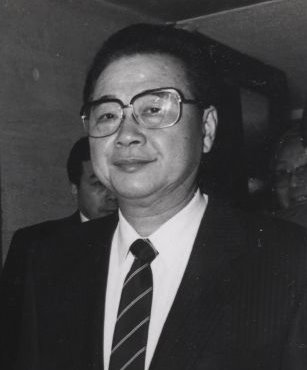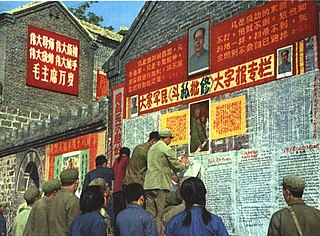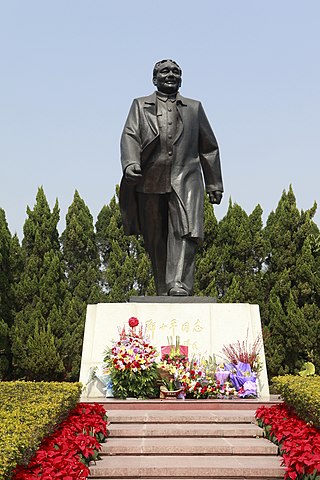
Deng Xiaoping was a Chinese revolutionary and high ranking politician who served as the paramount leader of the People's Republic of China (PRC) from December 1978 to November 1989. After Chinese Communist Party chairman Mao Zedong's death in 1976, Deng rose to power and led China through its process of Reform and Opening Up and the development of China's socialist market economy. Deng developed a reputation as the "Architect of Modern China" and his ideological contributions to socialism with Chinese characteristics are described as Deng Xiaoping Theory or in a more simpler term, that is used in western political science market socialism.

Li Peng was a Chinese politician who served as the fourth Premier of the People's Republic of China from 1987 to 1998, and as the Chairman of the Standing Committee of the National People's Congress, China's top legislative body, from 1998 to 2003. For much of the 1990s Li was ranked second in the Chinese Communist Party (CCP) hierarchy behind then Party General Secretary Jiang Zemin. He retained his seat on the CCP Politburo Standing Committee until his retirement in 2002.

The Gang of Four was a Maoist political faction composed of four Chinese Communist Party (CCP) officials. They came to prominence during the Cultural Revolution (1966–1976) and were later charged with a series of treasonous crimes due to their responsibility for the excesses and failures in the Cultural Revolution. The gang's leading figure was Jiang Qing. The other members were Zhang Chunqiao, Yao Wenyuan, and Wang Hongwen.

Hua Guofeng was a Chinese politician who served as Chairman of the Chinese Communist Party and Premier of the People's Republic of China. The designated successor of Mao Zedong, Hua held the top offices of the government, party, and the military after the deaths of Mao and Premier Zhou Enlai, but was gradually forced out of supreme power by a coalition of party leaders between December 1978 and June 1981, and subsequently retreated from the political limelight, though still remaining a member of the Central Committee until 2002.

The Tiananmen incident or the April 5 Tiananmen incident was a mass gathering and protest that took place on April 4–5, 1976, at Tiananmen Square in Beijing, China. The incident occurred on the traditional day of mourning, the Qingming Festival, after the Nanjing incident, and was triggered by the death of Premier Zhou Enlai earlier that year. Some people strongly disapproved of the removal of the displays of mourning, and began gathering in the Square to protest against the central authorities, then largely under the auspices of the Gang of Four, who ordered the Square to be cleared.
Moderately prosperous society or Xiaokang society, is a Chinese term, originally of Confucianism, used to describe a society composed of a functional middle-class. In December 1979, Deng Xiaoping, then paramount leader of China, first proposed the idea of "Xiaokang" based on the "Four Modernizations".

Big-character posters are handwritten posters displaying large Chinese characters, usually mounted on walls in public spaces such as universities, factories, government departments, and sometimes directly on the streets. They were used as a means of protest, propaganda, and popular communication. A form of popular political writing, big-character posters did not have a fixed format or style, and could appear in the form of letter, slogan, poem, commentary, etc.
The history of the People's Republic of China details the history of mainland China since 1 October 1949, when CCP chairman Mao Zedong proclaimed the People's Republic of China (PRC) from atop Tiananmen, after a near complete victory (1949) by the Chinese Communist Party (CCP) in the Chinese Civil War. The PRC is the most recent political entity to govern mainland China, preceded by the Republic of China and thousands of years of monarchical dynasties. The paramount leaders have been Mao Zedong (1949–1976); Hua Guofeng (1976–1978); Deng Xiaoping (1978–1989); Jiang Zemin (1989–2002); Hu Jintao (2002–2012); and Xi Jinping.

Deng Xiaoping Theory, also known as Dengism, is the series of political and economic ideologies first developed by Chinese leader Deng Xiaoping. The theory does not reject Marxism–Leninism or Maoism, but instead claims to be an adaptation of them to the existing socioeconomic conditions of China.
The 8th Central Committee of the Chinese Communist Party was in session from 1956 to 1969. It was preceded by the 7th Central Committee of the Chinese Communist Party. It held 12 plenary sessions in this period of 13 years. It was the longest serving central committee ever held by the Communist Party.

The National University of Defense Technology is a national public research university headquartered in Kaifu, Changsha, Hunan, China. It is affiliated with the Central Military Commission. The university is part of Project 211, Project 985, and the Double First-Class Construction. With the predecessor founded in 1953 as the People's Liberation Army Military Academy of Engineering (中国人民解放军军事工程学院) in Harbin, the institution was officially established in 1978 in Changsha by Deng Xiaoping.

Zhang Weiwei is a Chinese professor of international relations at Fudan University and the director of its China Institute. Zhang is also an Internet celebrity, spreading his political ideas through online video platforms such as Xigua Video, Bilibili, TikTok and YouTube.
In Maoism, a capitalist roader is a person or group who demonstrates a marked tendency to bow to pressure from bourgeois forces and subsequently attempts to pull the Chinese Communist Revolution in a capitalist direction. If allowed to do so, these forces would eventually restore the political and economic rule of capitalism; in other words, these forces would lead a society down a "capitalist road".

The Four Comprehensives, fully as the Four-pronged Comprehensive Strategy (四个全面战略布局), is a list of political goals for China, put forward by Xi Jinping, General Secretary of the Chinese Communist Party (CCP) in 2014. They are:
- Comprehensively build a moderately prosperous society → Comprehensively build a modern socialist country
- Comprehensively deepen reform
- Comprehensively govern the nation according to law
- Comprehensively strictly govern the Party.
Two Bombs, One Satellite was an early nuclear and space project of the People's Republic of China. Two Bombs refers to the atomic bomb and the intercontinental ballistic missile (ICBM), while One Satellite refers to the artificial satellite. China tested its first atomic bomb and first hydrogen bomb in 1964 and 1967 respectively, combining the atomic bomb with surface-to-surface missile in 1966, and successfully launched its first satellite in 1970.

The 10th National Congress of the Chinese Communist Party was held in the Great Hall of the People, Beijing, between August 24 and 28, 1973. 1,249 delegates represented the party's estimated 28 million members. It was preceded by the 9th National Congress and was succeeded by the 11th National Congress.
Yu Guangyuan was a Chinese economist, philosopher, and a senior official of the People's Republic of China. Yu was recognized as one of the first proponents of the socialist market-oriented economic system in China and the theory of "the Primary Stage of Socialism". He was a close adviser of and speech-writer for the Chinese leader Deng Xiaoping.

Boluan Fanzheng refers to a period of significant sociopolitical reforms starting with the accession of Deng Xiaoping to the paramount leadership in China, replacing Hua Guofeng, who had been appointed as Mao Zedong's successor before Mao's death in 1976. During this period, a far-reaching program of reforms was undertaken by Deng and his allies to "correct the mistakes of the Cultural Revolution", and restore order in the country. The start of the Boluan Fanzheng period is regarded as an inflection point in Chinese history, with its cultural adjustments later proven to be the bedrock upon which the parallel economic reform and opening up could take place. As such, aspects of market capitalism were successfully introduced to the Chinese economy, giving rise to a period of growth often characterized as one of the most impressive economic achievements in human history.
The Seven-Thousand Cadres Conference (七千人大会) was one of the largest work conferences ever of the Chinese Communist Party (CCP). It took place in Beijing, China, from 11 January to 7 February 1962. The conference was attended by over 7,000 party officials nationwide, focusing on the issues of the Great Leap Forward which resulted in the deaths of tens of millions in the Great Chinese Famine. CCP chairman Mao Zedong made self-criticism during the conference, after which he took a semi-retired role, leaving future responsibilities to Chinese President Liu Shaoqi and Vice Premier Deng Xiaoping.

Anti-bourgeois liberalization as a political slogan of the Chinese Communist Party (CCP), it was proposed by Deng Xiaoping and others in the early 1980s. As a political movement against "bourgeois liberalization", it started at the CCP Congress held in Beijing in September 1986. The Sixth Plenary Session of the Twelfth Central Committee of the CCP was officially launched in early 1987.













